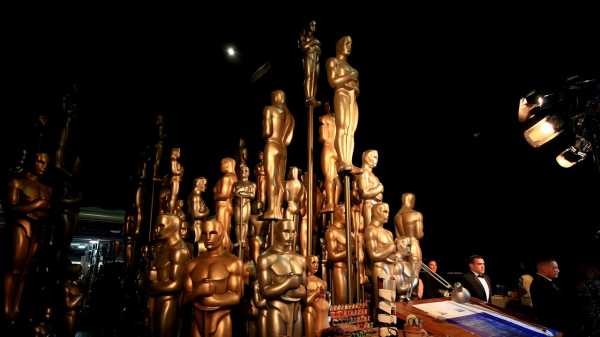
The tropes that undergird modern Oscar campaigns—those laborious, profligate, months-long efforts to take home a statuette, often by creating meta-narratives around the nominated films or artists themselves—have become as predictable as any Hollywood screenplay. But, occasionally, a novel spin or flawless execution can revitalize a tale we’ve all heard a thousand times before. So it is with Ke Huy Quan’s maneuver toward the Best Supporting Actor trophy for his (genuinely fantastic) performance in “Everything Everywhere All at Once,” in which he plays several versions of Waymond, the doting, tenderhearted, sometimes debonair husband of Michelle Yeoh’s Evelyn across the multiverse. Quan, who became a familiar face to American audiences after starring as Short Round in “Indiana Jones and the Temple of Doom” and Data in “The Goonies,” gave up his acting career for a period, when he found scant opportunities as an Asian American performer, eventually landing behind the camera. He’s not the only nominee with a comeback story: the awards push for lead actor Brendan Fraser, who enjoys a much anticipated return to the spotlight in “The Whale,” also asks the Academy of Motion Picture Arts and Sciences, to complete his arc by furnishing a happy ending. But a triumph for Quan would also lend some of its glow onto the entertainment industry at large: it would suggest that Hollywood, with its ugly concentration of power among the usual suspects, is capable of reform, and that a talented artist who once saw no path forward by dint of his race could, a generation later, be fêted for his contributions to a film that makes the crises within an Asian American family a matter of cosmic urgency.
Actors are the most visible beneficiaries of the ongoing calls for increased diversity in Hollywood, which come from the viewers, who wish to see more faces and realities reflective of their own, as well as from figures within the industry, many of whom view greater inclusion as a source of fresh ideas, cultural relevance, even moral legitimacy. (This year’s Oscars cause célèbre is the Russian invasion of Ukraine, which will likely bestow the Best Documentary prize to “Navalny,” about the Russian political dissident Alexey Navalny.) And yet those of us invested in a more capacious and curious popular culture have yet to fully grapple with how progress in the industry should be appraised. By default, then, events like the Oscars have come to serve as a primary yardstick of representational gains. Hence our joyless new annual award-season tradition: the scrutiny of the nominees and the eventual winners for their diversity, mostly in the acting races, despite their representing a vanishingly small fraction of the hundreds of films released in just this country each year.
Quan, who has already won a Golden Globe and a Screen Actors Guild Award for his turn in “Everything Everywhere,” heads into Oscar night as the virtual shoo-in for his category. Given his decades of one-sided adoration for the film business, it’s difficult to begrudge him a moment of joy; at last, it seems, Hollywood might love him back. But his hyper-visible (and seemingly wholly earnest) publicity strategy, which has included speeches that have made the rounds on social media, exemplifies not only how inordinately fixated we are on the award prospects of the most successful members of a minority group but how conversations about diversity more broadly coalesce around emotional appeals to viewers—the tugging of heartstrings.
That our preferred mode of measuring Hollywood diversity is affective—based on how it makes us feel—is undeniable. There are outliers. A handful of scholars and nonprofit organizations have meticulously tallied the screen presence of women and various minority groups, publishing the results in annual report cards. These tabulators include Stacy L. Smith at the University of Southern California and Darnell Hunt at the University of California, Los Angeles, who focus on race and gender; and GLAAD, whose exhaustive studies quantify “studio responsibility” in film and assess “where we are” on television. Less precisely, though perhaps more influentially, social media erupts in outrage every few years about the racial or gender makeup of major award-show categories; the #OscarsSoWhite movement began this way, and this year’s BAFTAs prompted a continuation of the discussion after not a single person of color won a film prize that night. But the representation discourse happens all year, and some participants seem to care more about the optics than the films or performances themselves. The question asked most frequently boils down to whether we “feel seen,” a phrase whose recent but widespread popularity can partially be attributed to its vagueness.
There’s nothing wrong with entertainment feeling good. (I’m including, under that term, marketing apparatuses like the Oscars, which inform consumers what milestones a project hits—and thus how “important” they are.) But who needs the notches of advancement when a movie just works? In recent years, there’s been a boom in Asian American films that have depicted and unearthed facets of myself that I hadn’t imagined would ever be explored onscreen. I’ll always have a fondness for “Crazy Rich Asians,” a fish-out-of-water romantic comedy that helped me let go of a shame I didn’t realize I’d been holding on to, of feeling “not Asian enough” on a continent that I’m from but that’s never felt like home. I felt gratitude toward “The Farewell,” an autobiographical drama about living an ocean away from beloved family members, for acknowledging on such a mainstream scale and with such lovingly idiosyncratic portraiture the emotional trade-offs of immigration. I’m not a gay man, but I savored “Fire Island,” last year’s queer rom-com from an Asian American perspective, in part for poignantly observing the crushing unavoidability of racialized beauty standards in a cutthroat sexual marketplace.
Representational pleasures are real and, yes, important. The films above, which run the gamut from the personal to the glossily corporate, pay tribute to antecedents (Michelle Yeoh, Margaret Cho) while carving out space for emerging talent. They approach the experiences of Asian Americans as significant, acute, and relatable, and however fleetingly they provide a sense of community, of not-aloneness. I hope everyone who cares about culture finds at least a handful of films and TV shows—or books or music or whatever else—that makes them feel that way.
But feel-good representation alone isn’t the solution to Hollywood’s diversity problem. Greater inclusion can’t advance without a more equitable entertainment industry that offers opportunities to artists of disparate backgrounds, who in turn have to be empowered to tell the kinds of stories they wish to tell. Our craving for representation should also encompass material that doesn’t always deliver immediate satisfaction—challenging, divisive, or self-critical narratives that may not affirm viewers, but can reveal truths or offer new insights.
Feelings are fickle, and seldom shared across a group. One member’s representation is another’s alienation. Discussing “Crazy Rich Asians” with me, a Korean American friend balked at the film’s reception as a landmark that was meant to speak to and for her; she thought it too Sinocentric and too wealth-obsessed to stand in for Asian America. I don’t share her objection, but it’s certainly a valid one. The expectation that representation will always come with a dopamine spike risks an undue emphasis on the most anodyne, least objectionable stories, the content packaged for maximum virality or as aspirational perfection. And eternal pessimism about Hollywood, especially when it’s only with an eye toward the industry’s uppermost tiers, can obscure genuine headway in the less glamorous middle and lower layers, where newcomers of all crafts gain experience, connections, and, when they’re lucky, the kind of critical acclaim that can launch careers to the next level. Reduced market pressures in the independent space, too, can create room for more experimentation, such as more niche themes, less conventional forms, and a relaxed demand for “universal” resonance.
Perhaps we’re already getting closer. The still-surprising front-runner status of “Everything Everywhere”—it’s currently predicted by the Oscar probability sites as the winner for top prizes like Best Picture and Best Director, in addition to Best Actress and Best Supporting Actor—has meant an embrace of a rather messy, exhausting, cheerfully vulgar sci-fi film, attributes seldom embraced by Academy voters in the past. Its talking rocks and nihilism bagels may not personally spark you. But it might still be progress. ♦
Sourse: newyorker.com






